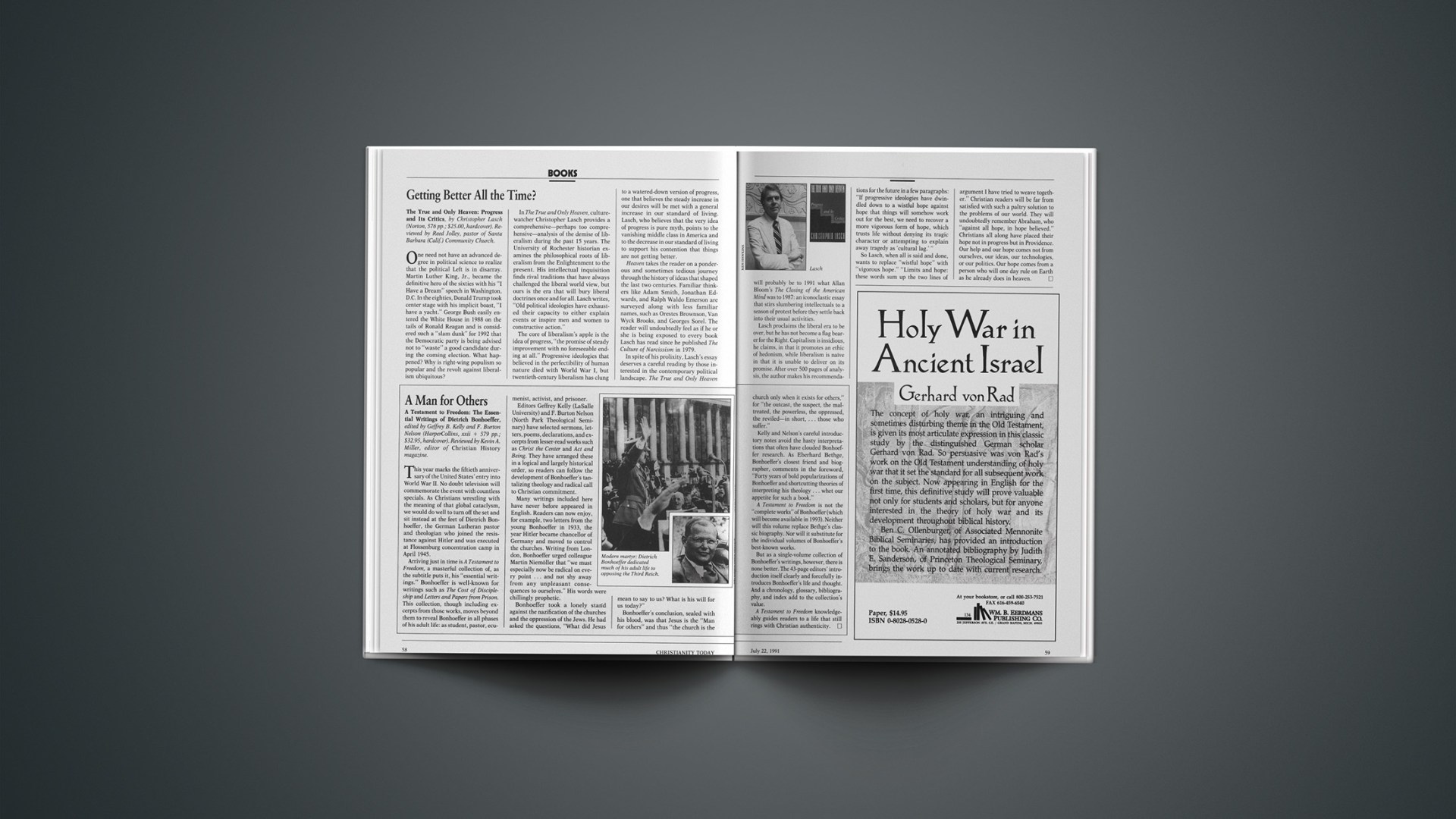The True and Only Heaven: Progress and Its Critics, by Christopher Lasch (Norton, 576 pp.; $25.00, hardcover). Reviewed by Reed Jolley, pastor of Santa Barbara (Calif.) Community Church.
One need not have an advanced degree in political science to realize that the political Left is in disarray. Martin Luther King, Jr., became the definitive hero of the sixties with his “I Have a Dream” speech in Washington, D.C. In the eighties, Donald Trump took center stage with his implicit boast, “I have a yacht.” George Bush easily entered the White House in 1988 on the tails of Ronald Reagan and is considered such a “slam dunk” for 1992 that the Democratic party is being advised not to “waste” a good candidate during the coming election. What happened? Why is right-wing populism so popular and the revolt against liberalism ubiquitous?
In The True and Only Heaven, culture-watcher Christopher Lasch provides a comprehensive—perhaps too comprehensive—analysis of the demise of liberalism during the past 15 years. The University of Rochester historian examines the philosophical roots of liberalism from the Enlightenment to the present. His intellectual inquisition finds rival traditions that have always challenged the liberal world view, but ours is the era that will bury liberal doctrines once and for all. Lasch writes, “Old political ideologies have exhausted their capacity to either explain events or inspire men and women to constructive action.”
The core of liberalism’s apple is the idea of progress, “the promise of steady improvement with no foreseeable ending at all.” Progressive ideologies that believed in the perfectibility of human nature died with World War I, but twentieth-century liberalism has clung to a watered-down version of progress, one that believes the steady increase in our desires will be met with a general increase in our standard of living. Lasch, who believes that the very idea of progress is pure myth, points to the vanishing middle class in America and to the decrease in our standard of living to support his contention that things are not getting better.
Heaven takes the reader on a ponderous and sometimes tedious journey through the history of ideas that shaped the last two centuries. Familiar thinkers like Adam Smith, Jonathan Edwards, and Ralph Waldo Emerson are surveyed along with less familiar names, such as Orestes Brownson, Van Wyck Brooks, and Georges Sorel. The reader will undoubtedly feel as if he or she is being exposed to every book Lasch has read since he published The Culture of Narcissism in 1979.
In spite of his prolixity, Lasch’s essay deserves a careful reading by those interested in the contemporary political landscape. The True and Only Heavenwill probably be to 1991 what Allan Bloom’s The Closing of the American Mind was to 1987: an iconoclastic essay that stirs slumbering intellectuals to a season of protest before they settle back into their usual activities.
Lasch proclaims the liberal era to be over, but he has not become a flag bearer for the Right. Capitalism is insidious, he claims, in that it promotes an ethic of hedonism, while liberalism is naïve in that it is unable to deliver on its promise. After over 500 pages of analysis, the author makes his recommendations for the future in a few paragraphs: “If progressive ideologies have dwindled down to a wistful hope against hope that things will somehow work out for the best, we need to recover a more vigorous form of hope, which trusts life without denying its tragic character or attempting to explain away tragedy as ‘cultural lag.’ ”
So Lasch, when all is said and done, wants to replace “wistful hope” with “vigorous hope.” “Limits and hope: these words sum up the two lines of argument I have tried to weave together.” Christian readers will be far from satisfied with such a paltry solution to the problems of our world. They will undoubtedly remember Abraham, who “against all hope, in hope believed.” Christians all along have placed their hope not in progress but in Providence. Our help and our hope comes not from ourselves, our ideas, our technologies, or our politics. Our hope comes from a person who will one day rule on Earth as he already does in heaven.










